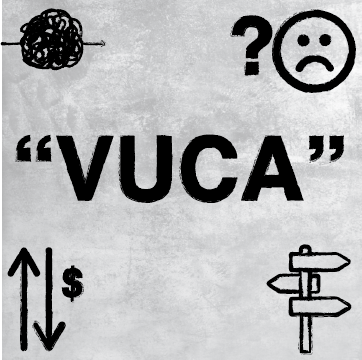Opinion | Embracing uncertainty in the age of “VUCA”
April 23, 2020
When the Dutch explorer Willem de Vlamingh saw the black swan for the first time on the west coast of New Holland in 1697, he was probably as surprised as we were to see a circuit breaker (trading halt) kicked in three times in two weeks for almost all stock market indexes.
The year 2020 seems to be full of unpleasant surprises. If I could travel four months back in time and tell my younger self a global pandemic would swerve in at the turn-of-the-year and take tens of thousands of lives, keep everyone at home and cause economic activities in some industries to be completely halted, I would’ve thought I made a twisted joke.
However, the past months have only been a fraction of the uncertainty that characterizes the age we are living in. Over the past 20 years, we have seen great changes, for good or worse, altering the landscape of geopolitics, economics and everyday life. And boy, it is a bumpy ride.
I have seen four globally infectious diseases, two market crashes, dozens of violent incidents, Britain’s exit from the EU and a TV celebrity becoming president. It really makes you feel old. And almost none of these great changes were foreseeable with our limited foresight.
This begs the question: What is this world that we are living in? The short answer is, we are living in a ”VUCA” world filled with uncertainty. The word VUCA is an acronym for volatility, uncertainty, complexity and ambiguity. It is a managerial term that became popular among for-profit organizations to describe decision making in situations characterized by these traits.
Get The Daily Illini in your inbox!
VUCA is originally borrowed from military action in describing strategic decision making. But as we can see, these characterizations are illuminating not only to business decision making but to policymaking and everyday decisions. They might help us maneuver through the ”fog of war.” We can definitely see this in the current crisis of global pandemic and market fluctuation.
But first, let me clarify the definitions. Volatility refers to an unstable situation with at least some knowledge available, for instance, the stock market. Uncertainty means the unknown changes that a sure event will bring about.
For example, with the halted economic activities and a sure drop in GDP, this is a potential change in the economic landscape. Complexity describes the situation in which the overwhelming volume or nature of information makes decision-makers hard to process.
A good example is the spread and duration of COVID-19 that is dependent on too many factors to count for. Ambiguity applies to “unknown unknowns” with no clear causal relationships. An example is COVID-19 before the outbursts, since no one expected such a disruption to the whole system.
But if we have learned anything from decision making under uncertainty, it is that humans are prone to biases and limits in our ability to make accurate predictions. According to Nassim Taleb, the author of the Black Swan, we have a tendency to construct a coherent narrative of past events that makes it difficult for us to accept the limits of our forecasting ability.
That is to say, after witnessing the past decisions and their consequences, we are likely to construct a story to justify the triumphs and failures. Such stories compel us to believe uncertainties are ultimately explainable by a certain pattern with inner consistency.
This can best be shown in a study conducted by professors at Duke University. They collected 11,600 forecasts of S&P 500 from CFOs from large corporations and examined their correlation between true value and estimates.
They found slightly less than zero correlation. In a capitalist culture, we have an overly optimistic belief skills will get us a definite result that makes us ignore the “unknown unknowns,” like the unexpected outlier of COVID-19, that if ignored, can overwhelm the whole system.
Therefore, this calls for a change of mindset in planning under uncertainty. Instead of perceiving the world as orderly and containing objective patterns, it should be assumed as chaotic and surprising.
The philosophy is never to come up with a specific plan and expect that it will yield exact payoff but to have a dynamic scheme that takes into account the outliers. This requires us to embrace the uncertainties, consider the potential failures and not take any strategy’s success for granted.
It is much like creating a drip painting. You let your hand go a certain way that is not deliberate and certainly not random but a perfect place in between.
Yutong is a senior in LAS.







